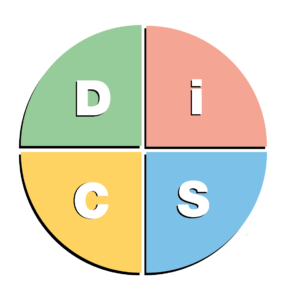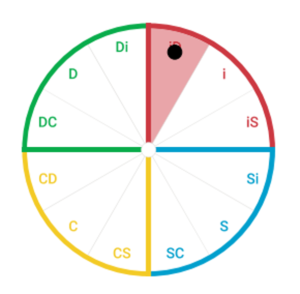Quick DISC Overview & Thomas (Personal Profile Analysis – PPA) vs. Wiley (Everything DiSC®)
The word “DISC” is ubiquitous in the personality inventory world. If you spell it two different ways, DiSC vs. DISC (notice the lowercase “i” vs.the uppercase “I”), then it can mean two very different things to some people. Let’s chat about some of the big differences between two companies that offer competing DISC products, Thomas International and Wiley.
DISC is one of the oldest behavior assessments out there, and there are a ton of companies that have created proprietary versions of DISC to best gauge where you fall in the spectrum of DISC personality. Thomas International and Wiley are at the top of the food chain in DISC-related products.
DISC focuses on four different personality traits, Dominance (D), Influence (I), Steadiness (S), and Conscientiousness (C). You may exhibit one of these traits stronger than the others. Or maybe you’re a blend of two of them.
Here at LEADx, we use Wiley’s brand of “Everything DiSC®” (notice the lowercase “i”). If you want more info about LEADx’s offerings of “Everything DiSC®” just go here.
I’m going to dive into the strengths of each of these company’s respective DISC products to help you make an informed decision if you’re trying to decide between the two.
If you stumbled onto this article because your HR department is asking you to take a DISC assessment and you have no idea what that is, then I’ve got you covered. I just want to be sure we’re all understanding some basic concepts here.
Quick DISC Overview
Before we dive into each company’s DISC products, let’s take a brisk look at the history of DISC.
William Marston created the DISC theory of personality, which is the root premise around the various behavior assessments related to DISC. All you comic book nerds out there may have thought, “Hey wait a minute, I know who that guy is!” And you're right; it's the same guy who created Wonder Woman.
Marston was a psychologist by training born in 1893 and died in 1947. One of the more unique aspects of Marson's personality was his living situation. He was involved in a polyamorous relationship with Elizabeth Marson (his legal wife) and Olive Byrne (life partner), both of whom were mothers of his children. Elizabeth and Olive continued to live together even after Marston's death (until Olive died in 1985).
Marston was involved in a lot of different projects besides DISC creation. He was one of the first researchers to develop an early version of the lie-detector test, which is now universally deemed “unreliable, unscientific, and biased,” according to a National Academy of Science study in 2003. Most of Marston's fame emerges from his creation of Wonder Woman for DC comics in the early 1940s.
Now that we've seen the spontaneous life of Marston let's get back to his ideas about DISC. Marston popularized his DISC theory of personality in his 1928 book, The Emotions of Normal People. Marston was mainly interested in people’s emotions and how their emotions influence behavior in “normal” people.
We need a little historical context with Marston's use of the word “normal.” Marson is using this word not as an antonym to “abnormal,” but as a synonym to the word “typical.” Marston's use of the word “normal” just means he did not include people with atypical psychological patterns in his theory (such as people with schizophrenia or psychopathy). Marston hypothesized that human behaviors could be sorted into four categories::
- Dominance (D)
- Inducement (I)
- Submission (S)
- Compliance (C)
Marston did not have an interest in development assessments to gauge people's scores in each of these categories. This idea started in 1956 with Walter Clarke, who created a test (based on Marston's model of human behavior) to measure people's scores in each of these scales.
As new research developed around human behavior, the DISC model adapted and shifted towards these four (more nicely worded) categories.
Now that we're on the same page about what the DISC model looks like, let's dive into two leading companies DISC models: Thomas (Personal Profile Analysis – PPA) vs. Wiley (Everything DiSC®).
If you want to read a more in-depth overview of the DiSC personality assessment, we’ve got an article for that too.
Wiley (Everything DiSC ®)
John Wiley & Sons, Inc. (commonly known as Wiley) is a worldwide leader in academic publishing that has existed for over 200 years. Wiley’s family of products includes educational tools for undergraduate, graduate, and professional development students. One of their most famous tools is the Everything DiSC ® series of assessments (which compromises many different assessment types).
Also noteworthy, Wiley was the first company to publish a DiSC Assessment in 1970 (Personal Profile System ®).
Everything DiSC assessments utilize the DiSC framework to shape how your personality influences you in different aspects of your work life. Let’s dive into how Everything DiSC utilizes the four personality categories. Everyone is a blend of each of the four styles, but most people have a strong preference for one or two styles.

When people take these assessments, they are assigned a “priority” (one of the four quadrants) and will generally have the characteristics associated with that quadrant:
Dominance (D)
- Direct
- Firm
- Strong-Willed
- Forceful
- Results-Oriented
Influence (I)
- Outgoing
- Enthusiastic
- Optimistic
- High-spirited
- Lively
Steadiness (S)
- Even-tempered
- Accommodating
- Patient
- Humble
- Tactful
Conscientiousness (C)
- Analytical
- Reserved
- Precise
- Private
- Systematic
It's a bit simplistic only to categorize people into four distinct areas, so when you get your results in an Everything DiSC assessment, it's a bit more in-depth.

There are two things to consider when getting these results.
First, where within the circle is your “dot”? A “dot's” location in the circle determines your DiSC style. The entire circle divides into 16 distinct styles. In this example, my “dot” is in the “i” region, but it also borders the “D” region, which means that I have an iD style.
Second, where is your “dot” in this circle? A dot's distance from the edge of the circle shows how naturally inclined a person is to the characteristics of their style. In this above example, my dot location is close to the edge, so I’m strongly inclined towards the attributes of the iD style.
Everything DiSC Workplace Assessment
Anyone can take this assessment, and you receive a robust 20-page report giving you deep insights into your personality. It includes topics like:
- Discovering your unique DiSC style and what it means for you
- Your motivators and stressors
- Understanding the styles of others
- How you can relate to people with different styles
- How to build more effective relationships (based on your personality)
- Tips on what strategies you can use to help you work more effectively with other people
Everything DiSC Management Assessment
This report leverages your DiSC style with a focus on people with management roles. It includes the above topics in the Workplace Assessment, but also consists of the following topics:
- Your Management Preferences
- Your Directing and Delegating Style
- Your Developing Others Style
- How does the environment you create help others find their motivation?
- How does your manager see you?
While the above two assessments are some of the most popular Everything DiSC assessments, other assessments that apply the DiSC personality profile are related to Sales, Leadership, Conflict Management, Emotional Intelligence, and 360 Surveys.
Overall, we believe that Wiley’s brand of the DISC assessment is the stronger one (see below for our reasons), which is why we use it here at LEADx.
Thomas (Personal Profile Analysis – PPA)
Thomas, like Wiley, is a worldwide DiSC leader that has been around since 1981. Unlike the Wiley company, Thomas focuses exclusively on the administration and training around DiSC, while Wiley has a strong publishing arm.
Wiley's DiSC model is used exclusively for improving workplace communication and performance. Like Wiley, Thomas has assessments related to EQ, 360s, and leadership. But, Wiley has additional assessments on Sales and Conflict Management.
Thomas' behavioral assessment can only take 8 minutes to complete, with 24 questions. However, Thomas' DISC test does NOT utilize computer-adaptive testing. Computer adaptive testing is essential because your answers to early questions will determine what kinds of questions you get asked in the future. This technique ensures that test-takers are answering a variety of questions consistently without spending too much time with unnecessary questions.
Wiley's assessment takes about 15 minutes to complete (a bit longer than Thomas'), because Everything DiSC utilizes computer-adaptive testing.
Like Everything DiSC. Thomas’ PPA assessment utilizes four profile factors and argues that all of us are a combination of all four of these domains, but we all have our preferences.
- Dominance
- Influence
- Steadiness
- Compliance (Wiley’s Everything DiSC calls this factor Conscientiousness)
Here’s an example report of Thomas’ PPA profile. You can see at a quick glance how much more robust the Everything DiSC one is.
The Everything DiSC Profile not only gives your style and tells you about yourself, but it also gives you advice on how to best leverage your style when working with others.
Why is Wiley’s Everything DiSC® better?
Here at LEADx, we use the Everything DiSC version of the assessment. With all the different DISC profiles out there. We believe Wiley’s brand of Everything DiSC is the best choice.
- Trust – over seven million people, in over 100,000 organizations, have taken an Everything DiSC profile (Thomas is used in 32,000)
- Accuracy – the Everything DiSC reports average 20 pages each, providing those “aha” moments and “scarily accurate” assessments for each participant (Thomas' report is only six pages)
- Reliable – ongoing validity studies and research from psychologists ensure quality.
- Support – Everything DiSC offers the most facilitator kits, tools, and activities of any provider.
How does LEADx maximize your Everything DiSC style?
LEADx’s objective with DiSC is to help people apply what they know by sending DiSC “nudges.” We define a “nudge” as an email or a push notification on your phone.
Typically, workshops introduce the Everything DiSC concept, often as part of new hire orientation or as part of leadership development training. Often, the DiSC lessons learned are never applied back on the job. It doesn't take a research study to see that we are all so “crazy busy” that we generally operate with short-term thinking in task-mode. It's hard to remember our style, others' styles, and to take the pause—the long deep breath—to think and modulate our approach.
One way to scale and sustain DiSC in the workplace is with behavioral nudges. Imagine if you had a DiSC coach who could remind you every week of your profile and how to leverage it?

Imagine if your digital DiSC coach could remind you of your team members’ dominant styles? And could remind you how to leverage their natural strengths?

If you want an automated DiSC nudge-based reminder system, only LEADx offers the behavioral nudge engine that can be activated for you within minutes.
Look for the trademarked lowercase “i” in DiSC® to be sure you're looking at the assessment tool researched, validated, and published by Wiley. And click here if you’d like to connect with a LEADx consultant who can answer your questions.





